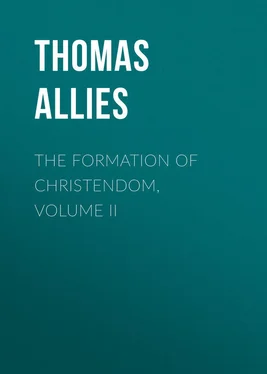Thomas Allies - The Formation of Christendom, Volume II
Здесь есть возможность читать онлайн «Thomas Allies - The Formation of Christendom, Volume II» — ознакомительный отрывок электронной книги совершенно бесплатно, а после прочтения отрывка купить полную версию. В некоторых случаях можно слушать аудио, скачать через торрент в формате fb2 и присутствует краткое содержание. Жанр: foreign_antique, foreign_prose, на английском языке. Описание произведения, (предисловие) а так же отзывы посетителей доступны на портале библиотеки ЛибКат.
- Название:The Formation of Christendom, Volume II
- Автор:
- Жанр:
- Год:неизвестен
- ISBN:нет данных
- Рейтинг книги:3 / 5. Голосов: 1
-
Избранное:Добавить в избранное
- Отзывы:
-
Ваша оценка:
- 60
- 1
- 2
- 3
- 4
- 5
The Formation of Christendom, Volume II: краткое содержание, описание и аннотация
Предлагаем к чтению аннотацию, описание, краткое содержание или предисловие (зависит от того, что написал сам автор книги «The Formation of Christendom, Volume II»). Если вы не нашли необходимую информацию о книге — напишите в комментариях, мы постараемся отыскать её.
The Formation of Christendom, Volume II — читать онлайн ознакомительный отрывок
Ниже представлен текст книги, разбитый по страницам. Система сохранения места последней прочитанной страницы, позволяет с удобством читать онлайн бесплатно книгу «The Formation of Christendom, Volume II», без необходимости каждый раз заново искать на чём Вы остановились. Поставьте закладку, и сможете в любой момент перейти на страницу, на которой закончили чтение.
Интервал:
Закладка:
Secondly, as to the opponents of this power. Now they offer a triple witness to its existence. The first of these is in the facts mentioned in the New Testament. The strongest, most terrible, and most inexplicable instance of this power lies in those diabolical possessions with which so many of our Lord's miracles are concerned. Again, as to the reality of divining powers arising from the presence of a demon in a human form, we have the evil spirit in the girl at Philippi acknowledging in S. Paul a servant of the most high God, and, when cast out by the Apostle in the name of Christ, leaving his victim destitute of those powers which had brought gain to her masters, who forthwith try to avenge themselves for their loss by exciting a persecution against the Apostle. 36 36 Acts xvi. 16.
A second witness is found in the rites and offices of the very power set up to dethrone and abolish this other power. The Church called upon every one who was received into her bosom to begin by renouncing the usurpation of this great enemy, which was thus declared to be universal. She provided forms for exorcising him. One of her Apostles warned those to whom he wrote that men could not partake at once of the Christian sacrifice and the heathen; for as truly as one was the chalice of the Lord, the other was the chalice of devils; as one was the table of the Lord, the other was the table of devils. 37 37 1 Cor. x. 21.
A third witness is found in the unanimous testimony of all Christian writers as to the reality of the demoniacal powers with which they were waging war; as to their perpetual interference with human life; as to the open and palpable effects which they produced; as to their unwilling retirement in the face of that Stronger One who was come upon them. It was not merely the fervid Tertullian who offered to rest the truth of Christianity and the life of any ordinary Christian upon his power publicly to expel a demon. Athanasius, who weighs every word he utters, says also, “Let him who will, try the truth of what we have said, and in the very presence of the spectral illusion of the demons, of the deceit of oracles and the wonders of magic, let him use the sign of the cross derided by them, only naming the name of Christ, and he shall see how by him the demons fly, the oracles cease, and every sort of magic and witchcraft is annulled.” No less express is S. Augustine in acknowledging the reality of these dark powers, and the wonders worked by them. 38 38 Tertullian, Apologeticus , 23; S. Athanas. de Inc. 48; S. Aug. de Civ. Dei , xxi. 6, who says, “Ut autem demones illiciantur ab hominibus, prius eos ipsi astutissima calliditate seducunt, vel inspirando eorum cordibus virus occultum, vel étiam fallacibus amicitiis apparendo, eorumque paucos discipulos suos faciunt, plurimorumque doctores. Neque enim potuit, nisi primum ipsis docentibus, disci quid quisque illorum appetat, quid exhorreat, quo invitetur nomine, quo cogatur, unde magicæ artes carumque artifices exstiterunt.”
Resuming then for a moment our view of heathenism as a whole, with regard to the exhibition of diabolic power in it, let us bear in mind, joined to the absence of moral teaching, its flagrantly immoral disposition; secondly, its illogical character, by which it is an insult to human reason while yet accepted by the human will; and thirdly, the superhuman effects noted in it and attached to its rites, ceremonies, and practices, attested by many generations alike of its victims as of its opponents. These proofs have each their own separate force, but they have likewise as to our conclusion a cumulative force; and its result is, that the existence of a diabolic kingdom and sovereign throned in heathenism, pervading its rites and directing its operations, which is so expressly declared in Holy Writ, is no less strongly proved by the facts of history.
6. Now, having sketched in four main points the substance of this polytheism, its multiplicity, its universality, its hold upon daily life, and its moral corruption, to all which a consummating force is added by the indwelling of diabolic power, it remains to give a glance at certain conditions and circumstances under which it was acting on the minds of men. We have here taken it and examined it by itself, abstracting it from those circumstances, but it never so appeared to those who lived under it. The wonderful error which so enfolded these widespread nations never exhibited itself to them bare and naked. On the contrary, it came to them interwoven with the dearest claims of the family, the city, the country, with the force of habit and tradition, with the dread of change, with the past history and future hopes of their fatherland, coloured moreover with the radiant dress of a rich and ever-advancing civilisation.
To judge of its power, vitality, and chance of permanence, we must look at it under these conditions. And if, when we regard this idolatrous polytheism in itself, one is lost in wonder at its ever having arisen, at its existence, at its continuance, so, when one regards it as throned in the customs, feelings, convictions, and interests of society, one wonders how any moral force could ever overthrow it. At the present time not only are there religions outside of Christianity, but there are also sects within it, so irrational, so devoid of the witness given by internal truth and harmony, so unable to render any account of themselves and their claims which will satisfy a mind looking for consistency, that, regarding them merely as facts, one cannot account for them, yet notwithstanding they may have existed for several hundred years, and had a large share in forming national habits of thought, or even national character; nay, perhaps their secret strength lies in some fold of this character itself. And because they are never seen by themselves, their intrinsic absurdity does not come before their adherents, and the last thing which these think of examining is the foundation of their sect, inasmuch as in fact it has never approached them otherwise than as a condition of their daily life. So we shall understand paganism better by considering it as interwoven with civilisation, polity, and national feelings. We will treat of it briefly under these three heads.
1. First, the whole eastern part of the Roman empire was made up of many various nations having a long and sometimes renowned history, kingdoms, and politics much anterior to Rome herself, of which the Romans had taken violent possession, but wherein remained still the fruits of a rich and undisturbed civilisation. And this word comprehends all the natural life of man, all the discoveries gained by his invention or experience, and accumulated by wealth descending from age to age, all the manifold ties of social intercourse, all the pleasures of the intellect, united, moreover, in their case with an art even now unrivalled in portraying the beauty of the human figure, and in the elegance with which it adapted material forms to the conveniences of life. So rich and varied an inheritance unfolded itself in a thousand Hellenic cities studding the shores of the Mediterranean. The culture itself since the time of Alexander might be termed Hellenic, but it embraced Egypt, and Syria, and all Western Asia. And so completely was idolatrous polytheism interwoven with culture, so inextricably was it blended with the bulk, so gradually had it grown with the growth, and wound its fibres about the tree and the branches, that the worship might be absolutely identified with the civilisation. The gods of Greece were the heads of the most illustrious Grecian families; their hero-worship consecrated every city, every grove, every field. The gods of Egypt were blended with the long renown of the Nile-land, with every Egyptian custom, with the beginning and the end of life. Not less had the gods of Syria and Western Asia occupied their respective lands. These deities struck their root into the home of man, into the union of the sexes, into the loves of parent and child, of brother and sister. They had their mementos in every street of busy traffic; they watched over the Acropolis; not a fountain but laid claim to their patronage, nor a field which was fruitful but by their supposed influence. These countries had lost their political independence, but the material ease of life under the majesty of the Roman name they retained. There was a passionate love for this world's goods, comforts, and enjoyments in the Greek, Syrian, Asiatic, Egyptian, and Libyan races, all of them more or less worn, and effete, and deeply sensualised; but their glory was this great Hellenic civilisation, with which polytheism might be termed one and the same thing.
Читать дальшеИнтервал:
Закладка:
Похожие книги на «The Formation of Christendom, Volume II»
Представляем Вашему вниманию похожие книги на «The Formation of Christendom, Volume II» списком для выбора. Мы отобрали схожую по названию и смыслу литературу в надежде предоставить читателям больше вариантов отыскать новые, интересные, ещё непрочитанные произведения.
Обсуждение, отзывы о книге «The Formation of Christendom, Volume II» и просто собственные мнения читателей. Оставьте ваши комментарии, напишите, что Вы думаете о произведении, его смысле или главных героях. Укажите что конкретно понравилось, а что нет, и почему Вы так считаете.












